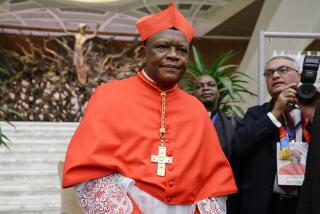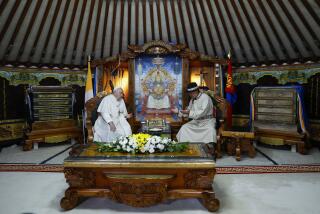Pontiff Offers African Leaders ‘Pact’ on Rights
- Share via
YAOUNDE, Cameroon — Pope John Paul II on Saturday offered the leaders of African nations what one Vatican official called “an implicit pact” that would assure them the Roman Catholic Church’s support in exchange for widespread human rights guarantees to their people.
During a whirlwind day that took him from Togo to the Ivory Coast and then to Cameroon, the traveling pontiff struck the same theme in addresses to each nation’s president.
As he put it in Abidjan to the 80-year-old Ivorian leader, Felix Houphouet-Boigny, “The future will not be happy or worthy of man unless the essential values of justice, freedom for persons and groups and a respect for life inspires all of society’s activity.”
Richness, Progress
In Lome, Togo, where he addressed President Gnassingbe Eyadema after a festive two-day visit that opened his current African pilgrimage--his third since becoming Pope--John Paul spoke of a “richness” that the Catholic community can “contribute to the progress of the nation.”
And in Cameroon, which according to Amnesty International has the worst human rights record of the three West African states, John Paul met with President Paul Biya and praised his country’s “tenacious will to develop its potential in a climate that harmonizes respect for groups, social justice and national unity.”
Joaquin Navarro Valls, a former Spanish surgeon and psychiatrist who is now the Vatican’s principal spokesman, said that the pontiff was in effect offering the presidents a deal that would benefit churches, states and people.
“In all these speeches,” he explained, “the Pope is offering the presidents an implicit pact. He is saying that if they can guarantee three things--social liberty for institutions and groups, justice and a respect for life--Catholics would collaborate in building up their countries.”
Not Just Code Language
Navarro said that the pontiff was not in this case using the term “respect for life” as a catch phrase aimed at abortion, as he has often used it in the past, but in its broad sense. Without specifically referring to the countries the Pope is visiting, Navarro noted that in Africa, “we are talking about countries where political opponents are often just killed.”
The spokesman said John Paul’s remarks had particular importance for the three political leaders to whom he talked because each faces difficulties that stem from tribal divisions often reflected in greater loyalty to tribe than country. Unifying forces such as Christianity and Islam tend to transcend those ancient and often bitter divisions, Navarro said.
“These leaders sometimes share a common interest with the church in their desire for national unity. From their point of view, the church can be a unifying force,” he added.
John Paul, globe-trotting leader of the world’s 800 million Roman Catholics who is on his 27th journey abroad, appeared to almost absorb the vigor and enthusiasm with which he has been greeted by thousands of Africans who have turned out to see him.
He bounded down the stairway of his chartered Alitalia DC-10 jet like a man two decades younger than his 65 years when he arrived Saturday morning in Abidjan to dedicate the modern new Cathedral of St. Paul and watch the unveiling of a larger-than-life bronze statue of himself on the cathedral grounds.
And in spite of the day’s heavy schedule, which began at dawn with preparations for his departure from Togo, John Paul still appeared fresh and thrilled by the crowds when he arrived here in the evening. He soon began a 3 1/2-day round of ceremonies and speechmaking through this relatively prosperous West African country, a former French colony that until late 1982 was led by longtime President Ahmadou Ahidjo, Biya’s predecessor and now his rival.
In all, the papal trip will last 12 days, taking him on to the Central African Republic, Zaire, Kenya and Morocco before his return to Rome on Aug. 20.
More to Read
Sign up for Essential California
The most important California stories and recommendations in your inbox every morning.
You may occasionally receive promotional content from the Los Angeles Times.












